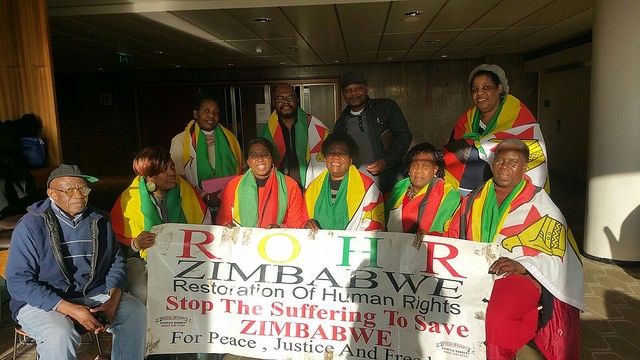Report on Rohr Zimbabwe’s South-East London Branch General Meeting of Saturday 25th July, 2015
By Tawanda Mawushe
26th July, 2015.
On Saturday 25th of July 2015, the South-East London branch of the Restoration of Human Rights (ROHR) Zimbabwe held a general meeting at 16 Sydenham Road, London, SE26 5QW from 2.00 pm to 6.00 pm
Attending the meeting were; Paradzai Mapfumo (Board Member and National Coordinator), Priscila Chitsinde (Organizing Secretary – UK and Secretary London Branch), Tawanda Mawushe, Fungai Mashezha, Chipo Kamhunga, Lorraine Mudjgiwa (Coordinator Northern Region) and Ben Tevten.
Apologies were received from Board Member and ROHR Spokesperson, Panyika Karimanzira and Lorraine Zimba.
On the agenda were;
- Continued developments in Zimbabwe from a human rights perspective
- Recent human rights infringements, documented and undocumented
- The continued work of ROHR in Zimbabwe
- The lack of development and deterioration of infrastructure in urban cities in Zimbabwe
Mr Mapfumo updated the meeting on the abduction of popular human rights activist Itai Dzamara in Zimbabwe on the 9th of March, 2015. Currently there were no reports or information on his whereabouts. There is an apparent lack of interest on the part of Government to either reveal or investigate his whereabouts and this has riled the citizens of Zimbabwe and the international community. Mr Itai Dzamara remains missing to date.
It was highlighted that the case of Mr Itai Dzamara was one of the most recent high profile cases involving a human rights activist going missing with suspicion of foul play on the part of Government. This however should not overshadow other basic human rights transgressions occurring in Zimbabwe on a regular basis. One key component of the human rights act is the freedom of speech, a right that is not afforded to many Zimbabweans currently residing in Zimbabwe. If basic human rights such as these cannot be upheld, it becomes ever more difficult to protect those that would seek to act according to the moral and legal statutes of the human rights laws.
Updates on the work of ROHR in the area of education were given.
We also had with us a young man by the name of Ben Tevten, a university student who was doing his dissertation on the topic of infrastructure and development in the city of Bulawayo in Zimbabwe post the liberation struggle with particular emphasis on the controversial subject of the Gukurahundi genocide. See link (https://en.wikipedia.org/wiki/Gukurahundi) for reference.
Please note that this link is purely for reference purposes and is not necessarily representative of the opinions of the author of this report or any member of the ROHR Zimbabwe.
The subsequent actions and reactions that followed the genocide that was Gukurahundi were among the topics discussed. Members of the committee who had been to Bulawayo, including our visitor, gave accounts of their experiences and first-hand witness accounts. The divide between the Shona and the Ndebele, a sore point and a stumbling block in the unification of Zimbabwe as a country was discussed. It was unanimously acknowledged that it was not only the responsibility but the obligation of the current Zimbabwean government to open up a platform for constructive dialogue to tackle the unresolved but ever-present issues affecting Zimbabweans across the country as well as in the Diaspora today. Human rights may not have been as widely acknowledged or discussed subject post Zimbabwe”s independence and during the country”s formative years but they are however pertinent in addressing the pain and frustration that is felt today by citizens of Zimbabwe, in particular the Ndebele people.
Issues such as infrastructure building, allocation of resources, equal representation in parliament are some of the issues that people wish to see addressed. This can only be achieved with openness and a willingness to make amends for past wrongdoings by state agents. The time for finger pointing and blame shifting has passed and it is now time for the Zimbabwean people to move forward as one nation. It is of the utmost importance that the government takes the leading role in this initiative.
Updates on developments on the ground in Zimbabwe were also given. Mr Mapfumo informed the meeting of all the work that was being done by ROHR in Zimbabwe ranging from supporting and promoting human rights activism to providing stationary to schools and children in need. ROHR continues to function in Zimbabwe, though with limited resources and even less freedom of movement. The organisation and its members strive to see justice done by the Zimbabwean government. ROHR continues to fight on behalf of the ordinary Zimbabwean, the ones without a voice, the one”s without a platform to express their grievances. The ordinary Zimbabwean would wish to see this once great nation return to the image of its former glorious self.
For pictures taken at the meeting click here.
Report written by:
Tawanda Mawushe
ROHR South East London Branch Committee Member


